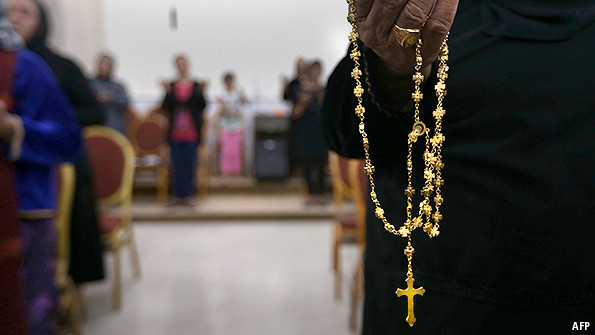
OVER the past 24 hours, senior representatives of the Catholic church have delivered some mixed messages about Islam.
The leaders of the Pontifical Council for Inter-religious Dialogue issued a statement urging the two faiths to work together to ease human suffering, especially in war zones. "We thank the Almighty for what we have in common, while remaining aware of our differences," the council announced in a message co-signed by Cardinal Jean-Louis Tauran, its president. "Inspired by our shared values...we are called on to work together for justice, peace, and respect for the rights and dignity of every person."
While it acknowledged the "importance of promoting a fruitful dialogue", the message put more emphasis on working together than on inter-faith discussion.
Meanwhile, a senior Christian cleric in Iraq, the head of the Chaldean Catholic church, sounded a bleaker note. As the last remaining Christians prepared to flee Mosul, in response to threats from the city's new masters, Patriarch Louis Raphael I Sako said "no dialogue was possible" with these ultra-Islamist forces, particularly as they have declared "between us there is only the sword."
As of yesterday, the patriarch told the information service Asianews.it, "cars equipped with loudspeakers [were] driving through the city, telling Christians to flee." A notice from the newly proclaimed "Islamic Caliphate" had told local Christians that they must either convert to Islam, pay the jizya poll tax which Islamic rulers once extracted from non-Muslim subjects, or get out. Only the very poorest, with no means of escaping, would remain.
To say that in such circumstances no dialogue is possible might sound trivial or obvious. But remember, the patriarch has a big personal stake in upholding the principle that Christians and Muslims can co-exist, and he has always argued that case. When there was a huge exodus of people from Mosul in early June, he stressed that Muslims as well as Christians were affected. He even insisted that the fighters of the Islamic State of Iraq and the Levant, who have swept across the region, might be willing to tolerate Christians. So this is not a man who succumbs easily to pessimism.
As for Cardinal Tauran, he is certainly no starry-eyed utopian in matters of inter-faith dialogue. He once expressed scepticism about the possibility of making much progress in theological exchanges with Muslims, given that they regard the text of the Koran as God's last word on everything. He has lived through a war in Lebanon, and helped organise a papal visit to that war-ravaged land in 2012, during which Pope Benedict held out an olive branch to the Islamic world.
After that visit, Cardinal Tauran said he hoped it had been established that "radical Islamism was the common enemy of Christians and Muslims." As the French cleric would no doubt say, recent events in Iraq have made the truth of his statement more evident than ever. But how many people, in the Middle East or anywhere else, are prepared to stand up and agree with him?
No hay comentarios.:
Publicar un comentario